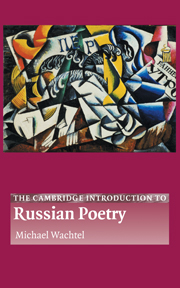Book contents
- Frontmatter
- Contents
- Preface
- Acknowledgments
- Note on translations and transliterations
- Introduction
- Part I Concepts
- Part II Interpretation
- Chapter 4 From the ode to the elegy (and beyond)
- Chapter 5 The ballad
- Chapter 6 Love poetry
- Chapter 7 Nature poetry
- Chapter 8 Patriotic verse
- Conclusion: poetry and pattern
- Bibliography
- Suggested further reading
- Index of poetic terms
- Index of names and works
Chapter 4 - From the ode to the elegy (and beyond)
Published online by Cambridge University Press: 05 June 2012
- Frontmatter
- Contents
- Preface
- Acknowledgments
- Note on translations and transliterations
- Introduction
- Part I Concepts
- Part II Interpretation
- Chapter 4 From the ode to the elegy (and beyond)
- Chapter 5 The ballad
- Chapter 6 Love poetry
- Chapter 7 Nature poetry
- Chapter 8 Patriotic verse
- Conclusion: poetry and pattern
- Bibliography
- Suggested further reading
- Index of poetic terms
- Index of names and works
Summary
Из па́мяти изгры́зли го́ды,
За что́ и кто́ в Хоти́не па́л,
Но пе́рвый зву́к Хоти́нской о́ды
Нам пе́рвым кри́ком жи́зни ста́л.
владислав Ходасевич, «Не я́мбом ли четырехсто́пным»The years have gnawed away from memory,
Who fell at Khotin and for what,
But the first sound of the Khotin ode
Became our the first cry of life.
Vladislav Khodasevich, “Not in iambic tetrameter”From the vantage point of the twenty-first century, the Russian eighteenth-century ode seems a forbidding and inaccessible genre. The poems are without exception long, the language archaic, the subjects political, the tone jingoistic and/or sycophantic. However, when placed in its literary, historical, and sociological context, this poetry can become fascinating and even aesthetically interesting. What the eighteenth-century odists were doing in the cultural sphere was no less ambitious than what Peter the Great had done in the political arena a few decades earlier. This was an attempt to bring a backward, isolated country into the modern age, to take what the West had to offer and adapt it to specifically Russian needs.
Before the eighteenth century, Russia had no viable secular literature. If such a tradition was to take root, it could only do so with the support of the ruling institutions. The Church, skeptical of the value of literacy beyond religious texts, was unsympathetic. So the would-be poet needed to enlist the support of the sovereign.
Information
- Type
- Chapter
- Information
- The Cambridge Introduction to Russian Poetry , pp. 65 - 80Publisher: Cambridge University PressPrint publication year: 2004
